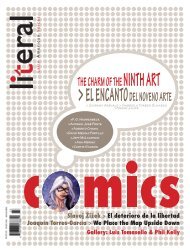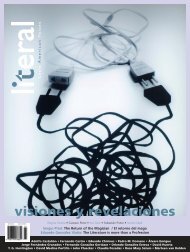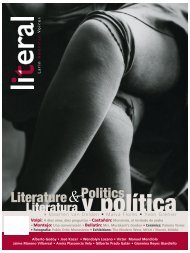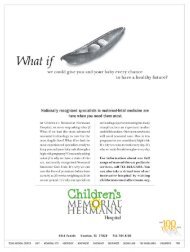Richard Serra - Literal
Richard Serra - Literal
Richard Serra - Literal
You also want an ePaper? Increase the reach of your titles
YUMPU automatically turns print PDFs into web optimized ePapers that Google loves.
Entre dogma y fe / Between Dogma and Faith<br />
n Rose Mary Salum / Interview with Irshad Manji<br />
IRSHAD MANJI NACIÓ DURANTE LA DICTADURÍA DE IDI AMIN<br />
en Uganda. Cuando tenía 4 años su familia emigró<br />
a Vancouver, en donde creció en un ambiente más<br />
abierto. Manji es autora del libro El problema con el<br />
Islam (The Trouble With Islam Today, 2005), traducido<br />
a más de 25 idiomas. En la actualidad, Irshad tiene el<br />
título de Senior Fellow dentro de la Fundación para<br />
la democracia europea. Es columnista en The New<br />
York Times, diario que difunde sus escritos por todo<br />
el orbe.<br />
***<br />
Rose Mary Salum: ¿El problema con el Islam en la<br />
actualidad, lo mismo que con la mayoría de las religiones,<br />
es que la gente toma los libros sagrados y las<br />
enseñanzas religiosas literalmente en lugar de metafóricamente?<br />
Irshad Manji: El problema con las religiones se<br />
origina cuando sus seguidores no distinguen entre fe<br />
y dogma. La fe es lo sufi cientemente segura para lidiar<br />
con cualquier incertidumbre. La fe no se necesita ver<br />
amenazada por preguntas. El dogma por otro lado,<br />
siempre se ve amenazado por los cuestionamientos<br />
porque el dogma, por defi nición, es rígido. Es quebradizo.<br />
Aparece bajo la luz de la indagación, por<br />
consiguiente merece ser amenazado por cuestionamientos.<br />
El problema del dogma afl ige a cada religión. Pero<br />
en el siglo XXI, no afecta de manera similar a cada religión.<br />
Desde luego, existe una aproximación acrítica<br />
en el cristianismo, judaísmo, hinduismo incluso en el<br />
budismo. Sin embargo, sólo en el Islam de hoy, a nivel<br />
mundial, la visión dogmática es la corriente principal.<br />
Permíteme explicar a lo que me refi ero con esta<br />
avasalladora afi rmación. La mayoría de los musulmanes,<br />
incluso en el Occidente, son rutinariamente educados<br />
desde su infancia para creer que, como el Corán<br />
fue revelado después de la Torá y la Biblia, es la versión<br />
fi nal, y por consiguiente, el manifi esto perfecto de la<br />
voluntad de Dios. Como tal, el Corán no se presta a las<br />
ambigüedades, inconsistencias y absolutas contradicciones<br />
de aquellos llamados textos “sagrados”. Incluso<br />
los musulmanes moderados creen que el Corán no es<br />
como ninguno de los otros libros sagrados. Es Dios 3.0<br />
y no aparecerá una nueva “versiòn”.<br />
Cristianos moderados, judíos moderados, hindús<br />
moderados y budistas moderados no tienen una relación<br />
tan poco crítica con sus respectivas escrituras.<br />
ISHRAD MANJI WAS BORN IN DURING UGANDA´S DICTATORSHIP<br />
Idi Amin. However, when she was 4, she and her family<br />
fl ed to Vancouver, where Irshad grew up in a much<br />
opened environment.<br />
Manji is the best-selling author of The Trouble with<br />
Islam Today, 2005, which has been translated to more<br />
than 25 languages. Currently, Irshad is a Senior Fellow<br />
with the European Foundation for Democracy. She<br />
writes columns that are distributed worldwide by The<br />
New York Times Syndicate.<br />
***<br />
Rose Mary Salum: Is The Trouble With Islam Today,<br />
along with most religions, that people take sacred<br />
books and teachings literally rather than metaphorically?<br />
Irshad Manji: Religions run into trouble when their<br />
adherents fail to distinguish between faith and dogma.<br />
Faith is secure enough to handle questions. Faith never<br />
needs to be threatened by questions. Dogma, on the<br />
other hand, is always threatened by questions because<br />
dogma, by defi nition, is rigid. It’s brittle. It snaps under<br />
the spotlight of inquiry–and therefore deserves to be<br />
threatened by questions.<br />
The problem of dogma affl icts every religion.<br />
But in the 21st century, it does not affl ict every religion<br />
equally. Of course, an uncritical approach to<br />
faith exists in Christianity, Judaism, Hinduism, even<br />
Buddhism. However, only in Islam today is dogmatism<br />
mainstream worldwide.<br />
Let me explain what I mean by that sweeping<br />
statement. Most Muslims, even in the West, are routinely<br />
raised to believe that because the Quran was revealed<br />
after the Torah and the Bible, it is the fi nal and<br />
therefore perfect manifesto of God’s will. As such, the<br />
Quran is not given to the ambiguities, inconsistencies<br />
and outright contradictions of those other so-called<br />
“sacred” texts. Even moderate Muslims believe that<br />
the Quran is not like any other holy book. It is God 3.0<br />
and none shall come after it.<br />
OTOÑO, 2007 • LITERAL. VOCES LATINOAMERICANAS 3 7






